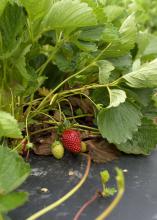Information Possibly Outdated
The information presented on this page was originally released on May 22, 2015. It may not be outdated, but please search our site for more current information. If you plan to quote or reference this information in a publication, please check with the Extension specialist or author before proceeding.
Rain brings challenges for strawberry growers
RAYMOND, Miss. – Seemingly endless rains this spring are challenging Mississippi’s strawberry crop.
“The frequent rains we had in the last few months put pressure on the bloom and fruit quality,” said Bill Evans, a horticultural researcher with the Mississippi Agricultural and Forestry Experiment Station. “In April alone, we got more than 7 inches of rain.”
The wet weather compounded poor winter growth by further reducing flowering and fruit set and increasing disease pressure, said Evans, who is based at the Mississippi State University Truck Crops Branch Experiment Station in Crystal Springs.
“High volumes of rain reduce the fruit’s sugar content, and many producers have had fruit rot on the vine,” he said.
Although several growers have produced fewer strawberries, Myron Unruh of Lazy U Farm in Macon, said he has had a decent year.
“Our strawberries are doing good,” Unruh said. “It’s not spectacular, but we’ve had worse years for strawberries.”
Unruh said despite the battle against fungal disease this year, his berries are average in size and are quite tasty, according to his customers.
“I’ve had to spray fungicide several times this year with all the rain,” said Unruh, who grows the crop on three-quarters of an acre at his agritourism operation. “But the size has been average or above, and people are telling us that they are exceptionally sweet this year.”
In addition to other summer crops, such as watermelons, tomatoes, green beans, okra and peas, Unruh and his wife, Shelia, grow fall crops and offer activities throughout the year for families and school groups. For more information on the Noxubee County farm, visit http://www.lazyufarm.com.
Evans said most of Mississippi’s strawberry growers produce the crop on one acre or less for local markets.
“There has been an increase in interest from people who want to grow half an acre to an acre of strawberries,” the MSU researcher said. “So, we are preparing to do a strawberry variety trial here at the station to determine which ones perform best.”
The value of production for Mississippi’s horticulture industry -- which include berries, vegetables, melons, potatoes, fruits, tree nuts, nurseries, greenhouses, floriculture, sod and Christmas tree farms -- was estimated at $114 million in 2014.
From 2006 to 2014, the number of small farms producing specialty crops, such as fruits and vegetables, increased from about 20 to about 85, according to the Mississippi Department of Agriculture and Commerce. Farmers markets followed suit, growing from 23 known markets in 2004 to 84 markets by 2014.
These markets provide exponential benefits for growers, consumers and communities, including more nutritious food options, low-cost sales channels, educational opportunities for the public and improved community relationships. To learn more about farmers markets in Mississippi or to locate one, visit http://www.farmersmarkets.msstate.edu.




